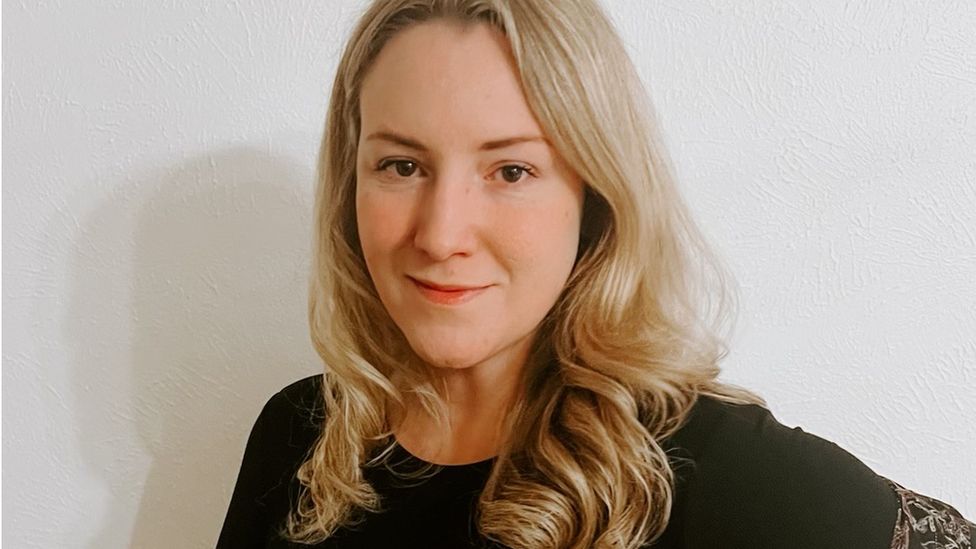Kate Cox sued Texas to have an abortion after her foetus was diagnosed with a high-risk condition.
 Image source, Kate Cox
Image source, Kate CoxA woman who sued Texas to get an abortion for her high-risk pregnancy has left the state to have the procedure, her lawyers have said.
Kate Cox, 31, sought an abortion after her foetus was diagnosed with trisomy 18, a potentially fatal condition that doctors said threatened her fertility.
A lower court granted permission for an abortion, but the Texas Supreme Court cancelled that exemption on Monday.
Texas has one of the strictest abortion bans in the country.
Abortions in the state are prohibited from the point of conception, except in rare cases where the life of the expectant mother is under threat.
Abortion advocates argue the exception is too vague and puts women’s health at risk.
According to Ms Cox’s court filings, doctors refused to perform an abortion on her, saying their “hands were tied” as long as her baby had a heartbeat.
Ms Cox’s case was believed to be the first to seek a court-ordered abortion since the US Supreme Court overturned Roe v Wade last year, giving individual states power to control abortion access.
The 31-year-old from the Dallas area found out about her diagnosis shortly after Thanksgiving. Trisomy 18 is a chromosomal disorder which in the majority of cases results in miscarriage, stillbirth or the death of the baby within the first year of life.
The mother of two was granted an exception by a Texas judge on Thursday. But the state’s Attorney General Ken Paxton quickly threatened criminal prosecution against any doctors or healthcare providers who helped her obtain an abortion.
Mr Paxton also asked the state’s Supreme Court to intervene. The court obliged, temporarily blocking Ms Cox from obtaining an abortion while it reviewed the case.
On Monday, just hours after the announcement by Ms Cox’s lawyers that she had left the state for the procedure, the state Supreme Court ruled against her.
In their ruling, the judges said they must respect the “policy choice” of state lawmakers. They also ruled that Ms Cox’s doctor had not properly attested that her safety was threatened due to a “life-threatening physical condition” as required under the law.
Nancy Northup, president and CEO at the Center for Reproductive Rights, the pro-choice group representing Ms Cox, said: “This past week of legal limbo has been hellish for Kate.”
“Her health is on the line. She’s been in and out of the emergency room and she couldn’t wait any longer. She desperately wanted to be able to get care where she lives and recover at home surrounded by family. While Kate had the ability to leave the state, most people do not, and a situation like this could be a death sentence.”
The Center did not disclose where Ms Cox has travelled and said she was not available for comment. It is unclear whether her decision to leave the state could have had an affect on her case.
There is no Texas-wide law prohibiting travel outside of the state for an abortion, but some counties have passed such restrictions in recent months. In October, Lubbock County became the largest county to enact such a measure, making it illegal for anyone to transport a pregnant woman through the county, or pay for her travel, for the purposes of obtaining an abortion.
The Texas Supreme Court is also weighing another abortion case related to the state’s health exception.
Again led by the Center for Reproductive Rights, 22 plaintiffs – including doctors and women denied abortions in the state – have sued to clarify the existing state bans, saying the medical exception is dangerously unclear.
Molly Duane, a lawyer for the organisation, told the all-Republican court late last month that the near-total ban had left physicians “terrified” to use their medical judgment over fear of harsh penalties.
Doctors who perform abortions in Texas could risk life in prison, loss of their medical licence and hundreds of thousands of dollars in fines.
A lawyer for the attorney general, Beth Klusmann, argued existing standards allowed physicians to use “reasonable” medical judgment.
That case – Zurawski v State of Texas – could be decided by the state’s highest civil court in the coming weeks.
This video can not be played